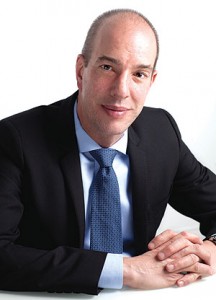
ACLU Executive Director Anthony D. Romero.
By Blake Maddux
On November 13, Tufts University hosted its 16th Annual Richard E. Snyder President’s Lecture Series event. The speaker was Anthony D. Romero.
Romero became the executive director of the American Civil Liberties Union (ACLU) exactly one week prior to the terrorist attacks of September 11, 2001. He is the first Latino and the first openly gay man to hold the position, which is second only to that of president in the organization.
Born in New York City to parents from Puerto Rico, Romero was the first high school graduate in his family. He went on to earn degrees from Princeton University and Stanford University Law School.
In 2005, Time magazine included Romero, then 40 years old, on its Top 25 Most Influential Hispanics in America list. Two years later, he published the book In Defense of Our America: The Fight for Civil Liberties in the Age of Terror, which he co-authored with NPR correspondent Dina Temple-Raston.
The title of Romero’s talk at Tufts was Sticks and Stones: Freedom of Expression and Political Correctness. Its main focus was the introduction (in the 1980s) and continuing danger of speech codes on college campuses. His conclusion was that such codes, which aim to enforce “politically correct” language, are “well-intentioned efforts to provide a nurturing environment” that nonetheless have “no place” on campuses.
Romero explained that as “a gay Puerto Rican kid” and an openly homosexual public figure, he has suffered since childhood the pain of having cruel epithets flung at him.
He asserted that, despite the old saw that he quotes in the title of the lecture, “Names can hurt a lot. They can diminish self-confidence. They can dredge up awful memories. They can arouse primal fears.”
To Romero, these truths are not enough to justify speech codes at colleges. As a law student at Stanford in the 1980s, he witnessed some of the first efforts to enact such codes.
“Banning words doesn’t make the hate go away,” Romero said.
“In fact, prohibiting the discussion of obnoxious and repugnant ideas can ultimately have the opposite effect: to drive the hate and the bigotry underground. It doesn’t go away. It becomes harder and harder to address it, harder and harder to lance the boil of the infection of hate and bigotry when you can’t see it on the surface. The best way to have a nurturing environment, a healthful environment, is to understand what people think and to engage one another.”
As Romero told it, the history of political correctness has been a classic debate between “progressive” and “conservative” forces on college campuses.
“Speech codes had their origins in what can only be described as [the] progressive instinct to protect vulnerable students, largely those coming from disadvantaged backgrounds, like myself,” Romero explained. “The instigators from whom they needed to be protected were largely seen as conservatives”.
Neither side, in Romero’s estimation, has reason to claim the high ground in the ongoing battle.
He referred to an incident involving Tufts University’s The Primary Source, a conservative, student-run publication. In 2006, this magazine printed a parody of O Come All Ye Faithful called O Come All Ye Black Folk, which mocked the value of racial quotas in college admissions.
Although Romero described the piece as “bigoted” and “wrong-hearted,” he also adamantly proclaimed it to be an exercise of freedom of speech.
“They have the right to express it, and we [the ACLU] have the right to shout them down even more loudly.”
Romero then declared, “Progressives have shown an unfortunate knack for turning concern for vulnerable students, which is laudatory and right, into a disregard for free speech.”
Here, he cited the frequency with which conservative speakers are “heckled, accused of hate speech, [and] forced to cancel or change venues.”
“Once you concede that some authority has the right to determine what is and what is not legitimate speech, you’ve lost control of your own speech,” Romero said.
He continued, saying, “Efforts to control free speech are like tear gas. You think you’re pointing the tear gas in that direction, because that’s what you want to be able to control. And then the wind all of a sudden picks up, and puts that tear gas right back into my eyes.”
Throughout the lecture, Romero emphasized the importance of the “free and frank exchange of ideas” at colleges, which he described as “the incubator[s] of those free ideas that germinate elsewhere.”
In order to drive this point home, he stated, “Redistributive economics, broad support for the Civil Rights Movement and the abolition of slavery among whites, Occupy Wall Street, the anti-Vietnam protests, all began and gestated on college campuses before the moved into the public eye, before they moved into the media, before they moved into the state legislatures and the halls of Congress.”
Romero also credited “the post-Reagan conservative resurgence” to debate at college, and said that academic life is richer thanks to the many issues that it raised for discussion.
Romero closed his talk by confidently asserting, “I’d rather live in a country where I read hateful, hurtful things that create sleepless nights for me, than to live in a country where people can’t speak their mind, can’t express their viewpoints, can’t love whom they love, can’t explore the hard issues.”
Whether one chooses “to get in people’s faces” or to simply attend the meetings of groups with whom they disagree, the freedom to do so, Romero said, is worth those sleepless nights.












Reader Comments